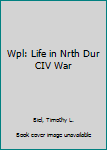Life in the North During the Civil War (Way People Live)
(Part of the The Way People Live Series)
Describes urban, rural, and Union Army camp life in the northern United States during the bloodiest war in America's history. This description may be from another edition of this product.
Format:Paperback
Language:English
ISBN:1560063343
ISBN13:9781560063346
Release Date:January 1997
Publisher:Lucent Books
Length:127 Pages
Weight:0.75 lbs.
Dimensions:0.5" x 7.8" x 9.3"
Age Range:10 to 13 years
Grade Range:Grades 5 to 8
Customer Reviews
1 rating
Not faultless, but a good comprehensive intro
Published by Thriftbooks.com User , 18 years ago
In this companion to Reger's Life in the South During the Civil War (Way People Live) (see my review), author Biel, like his counterpart, takes a necessarily brief overview of the Northern states in 1860-5 (including a number of fascinating bits from the Census of the former year). He begins with a quick look at the ways in which the Industrial Revolution, by then 70 years old, had made of the North almost a separate country from the South, goes on to describe the process of tooling up for war and the life of a common soldier, and studies the economic impact of the war and the lives of typical common people in the city and on the farm. (He unfortunately completely ignores the middle ground, the Small Town, which was the focus of every community of farmers.) He also includes a careful explanation of the reasons for the anger of the "working class" and contemporary descriptions of the New York Draft Riot to which they led. One of the best parts of the book is his description of how the poor of the day (mostly immigrants) came to be more and more trapped in their poverty, how little the booming economy helped them, and how, in the end, the war's close may have brought hope to some. Unfortunately he includes several rather glaring errors of fact which an alert editor should have caught: he says Stephen A. Douglas was particularly popular in West Virginia (which didn't exist till 1863), says that subscription magazines were "a relatively new idea in the 1860s" (they'd been around for over 20 years), mentions potbellied stoves as being used for cooking (they were heating devices only), and describes Grange activities although the organization wasn't founded till 1867. He also describes a divining rod as being a "highly unreliable" way to find underground water--which, as many a veteran of Vietnam can testify, it isn't. Still, I found this volume a source of much information I hadn't found elsewhere, and would recommend it as a good place to start on the subject.






